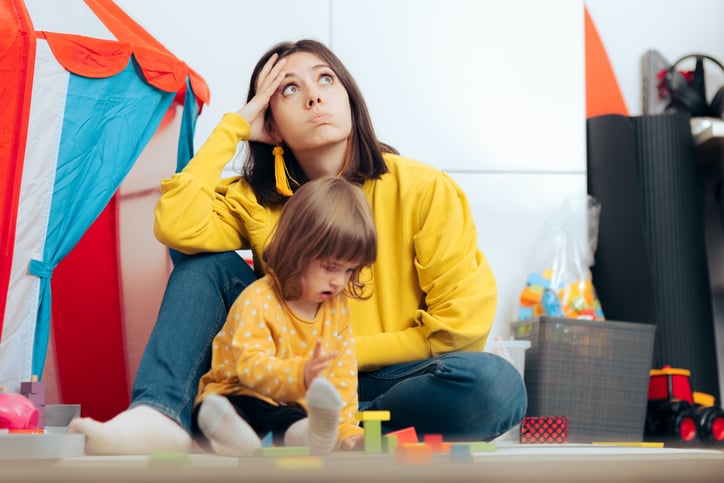The Effects of COVID-19 on Parents of Children With Autism
3 Strategies and 5 Great Apps for Destressing and Walking Down the Long Road to “Normal”
The COVID-19 pandemic created a worldwide crisis that has left behind lasting effects on the emotional health of the population. Among those most significantly impacted are individuals with autism spectrum disorder (ASD) and their parents/guardians.
Autism is characterized by social communication difficulties, challenges adjusting to unexpected change, a love of repetition or “need for sameness,” unusually narrow interests, and sensory hyper- and hypo-sensitivities as compared to neurotypical individuals. Some autistic people have no functional language and severe developmental delays, others have milder learning difficulties, and others have average or excellent language skills and are of average or high intelligence. For autistic individuals who have more serious characteristics of autism, this can create significant challenges and limitations in daily life function. On average, 1 in 36 children is identified with autism (ASD) with an estimated 40% presenting as nonverbal.
With the announcement of the COVID-19 pandemic in the spring of 2020, came restrictions and preventative measures to reduce the spread of transmission. Some of those restrictions included wearing a facemask, social distancing, the closure of schools and many places of employment, as well as self-isolation. The full effect of the pandemic and lockdown restrictions on development and mental health is still being determined. However, we do know that typically healthy individuals have experienced mental health challenges during lockdown with many individuals with ASD presenting with increased distress.
Individuals with autism often rely on daily routines, planned activities for social interactions, and face-to-face therapy and support. The disruption to daily life, lack of structure, the need for social distancing, and the requirement to wear facemasks reportedly caused high levels of anxiety, irritability, aggression, hyperactivity, impulsivity, and reduced attention.
Parents and guardians of individuals with ASD also experienced increased levels of stress and isolation as they worked to support and create “normalcy” for their children. Many parents of children with special needs rely on a school-based team, therapists, and other caregivers to support them and their children through the weeks. However, with everyone experiencing the rapid changes brought on by the pandemic, the familiar family support was stripped away leaving parents of children with autism to receive very little support.

Parents were experiencing reduced communication regarding professional appointments made before the pandemic, a lack of individual and family support post-diagnosis, no further parent training or support with environmental modifications, reduction (or even a halt) to necessary therapies for their children, and a loss of in-home support. Virtual learning and therapy sometimes caused stress for parents and in some cases, their children were challenged by the sudden shift to virtual support. Parents were struggling to support their children’s growth and development and found it almost impossible to balance helping their children while attempting to work from home. Unfortunately, this was a time when these families needed more support than ever.
Even though restrictions loosened and ended as COVID-19 cases decreased, the reality is that the mental health effects of COVID-19 can continue to weigh on many of our lives for years to come. Parents of children with autism walked down the long road to “normal” as they tried to reschedule appointments, get their children back into necessary therapies and in-person or improved online schooling, and work to reteach routines and behaviors while also trying to boost their mental health.
For parents, one of the most needed first steps after restrictions were lifted was trying to find ways to support their own mental health so that they can continue to help support their children. Worrying about when, where, and how to carve out time for themselves, can be very stressful for parents.
Below is a list of effective stress management activities and techniques for parents that do not require a lot of planning or time away from home.

Exercise
Exercise and physical movement are great for mental clarity, increased energy, and the reduction of stress. For parents, it is not always easy to schedule a time to go to the gym. However, there are many ways in which parents can work in movement and exercise without having to get into the car.
-
Virtual Gym
One thing the pandemic brought to us was an increase in access to virtual gyms/workouts. There is a variety of fitness companies that offer workout programs that can be done in the home. Some local gyms are now offering live virtual fitness classes that one can easily sign up for on their gym website. Streaming services are also offering fitness programs for all ability levels, with many of them being offered for free. -
Yoga
Yoga is a great way to clear and refocus your mind and increase balance and mental clarity. If you aren’t streaming or joining a live virtual yoga class, you can still set aside some time to stretch and work on your balance in your living room.
-
Outdoor Exercise
Fresh air and sunshine are natural ways to boost a chemical in your brain called serotonin, which can give you more energy and help keep you calm, positive, and focused. Take advantage of a nice day by going for a walk, jog, or bike ride in your neighborhood.
-
Outdoor Activities
If exercise isn’t something you enjoy, you can still get in some physical movement, clear your mind, and increase your serotonin outdoors by doing some gardening, lawn work, or washing your car.
Journal Writing
Journal writing is a great way to confront your feelings and reduce stress. Sometimes people struggle with what they should write about. Setting aside a short amount of time each day to write about events that took place, things that went well, or something you want to work on is always a great start. Don’t put too much pressure on yourself. Let the words flow, and don’t judge yourself too harshly. As you write down your feelings try to accept them and know that they are not permanent but only transitory states. If you are struggling for something to write about try these 44 Prompts, Examples, and Exercises for Journaling for Mindfulness.

Meditation
Meditation is proven to reduce stress, support changes in habits, and increase the quality of sleep. Similar to home fitness, there is a variety of ways in which you can gain access to meditation tutorials.
-
Apps
A quick Google search will provide you with a variety of available apps that teach you how to meditate. Some of them even provide ways to track your sleep and stress levels.
Here are some great apps to choose from to get started. Some have a fee and others are free for educators.
- Calm
- Headspace
- MyLife Meditation
- Smiling Mind
- Dreamykid
- Insight Timer
- Healthy Minds Program
- Above & Beyond Education
For additional suggestions see our free download for apps that can help you and your autistic child destress.
-
Virtual Meditation
Meditation classes and tutorials can be found on a variety of streaming devices. They provide classes from beginner to advanced.
A good place to start with is this free 10-minute introduction to meditation: Ten Minute Meditation for Beginners

For more information on ways to reduce stress or the effects of COVID-19 on individuals with autism and their parents, check out the following resources:
- To learn about more ways in which parents can work towards reducing their stress during these challenging times, read about the ideas provided by Penfield Children’s Center.
- The Disability Scoop provides a more in-depth understanding of the stresses that the COVID-19 pandemic created for parents of children with special needs.
- The National Library of Medicine, Science Direct, and Springer Link are great places to continue to look into the COVID-19 effects on individuals with autism and the studies that were conducted.

Lauren Ciran
Lauren has been a special education teacher for eleven years for both private and public schools. She began as a self-contained classroom teacher for students with severe and profound needs but has spent the majority of her career as a case manager and resource teacher for special education students in general education classrooms. Most recently, she took part in a major switch to full inclusion and co-teaching. Although it was challenging, she very quickly saw the benefit it had on all of the students. After recently making a major move from Illinois to Florida, she has started to shift her career out of the classroom while still supporting students, families, and schools by sharing my experiences, knowledge, and expertise as it relates to special education, inclusion, co-teaching, and the IEP process.




